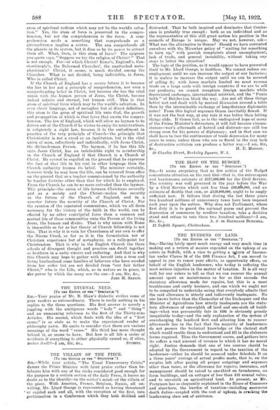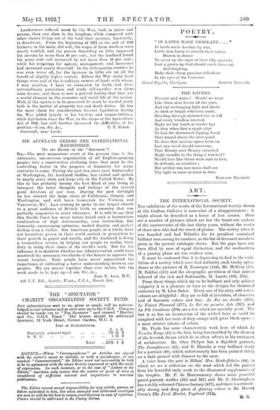THE BURDENS ON LAND.
[To THE EDITOR OF THE " SPECTATOR."]
Sia,—Having lately spent much energy and very much time in making out a return of monies expended on the upkeep of an estate in Suffolk, with a view to getting a %turn of Income- tax under Clause 34 of the 1918 Finance Act, I am moved to appeal to you to renew your efforts, as opportunity offers, on behalf of the English landowner, who to-day is suffering the most serious injustice in the matter of taxation. It is all very well for our rulers to tell us that we can recover the annual amount spent on maintenance so far as this exceeds the statutory allowance made for repairs, but this is a most troublesome and costly business, and one which we ought not to be compelled to undertake seeing that everybody admits that the said allowance is utterly and ludicrously inadequate. No one knows better than the Chancellor of the Exchequer and the Minister of Agriculture how utterly inadequate are the statu- tory allowances of one-eighth off land and one-sixth off build- ings—what was presumably fair in 1896 is obviously grossly inequitable to-day—and the only explanation of the system of overcharging the landlord first and allowing him to recover afterwards lies in the fact that the majority of landowners do not possess the technical knowledge or the clerical staff which would enable them to understand and fill in the elaborate forms required. Thus the Government scores, and gathers into its coffers a vast amount of revenue to which it has no moral right. Justice demands that one of two courses should be adopted by the Government in regard to the taxation of the landowner—either he should be assessed under Schedule D on a three years' average of actual profits made, that is, on the surplus left after paying all proper outgoings and expenses other than taxes, or the allowance for repairs, insurance, and management should be raised to one-third on farmhouses, on farm buildings, and on cottages of less than £12 annual value, and to one-sixth on agricultural land. At present, as Mr. Pretyman has so eloquently explained in the House of Commons and elsewhere, the burden of taxation—including enormous death dutiee—coupled with the cost of upkeep, is creaking the landolirning class out of existence,
Landowners suffered more by the War, both in purse and person, than any class in the kingdom, while compared with other classes living out of the land their position, financially, is disastrous. From the beginning of 1915 to the end of 1920 farmers, in the main, did well, the wages of farm workers were nearly trebled, and the parson depending on tithe improved his income by more than 40 per cent., but the landlord found his gross rent roll increased by not more than 10 per cent., while his outgoings for upkeep, management, and insurance had increased nearly threefold. In the tithe-paying counties he was even worse off, for the increase in tithe ate up all the benefit of slightly higher rentals. Before the War many hard things were said of the hereditary owners of land—with whom, I may mention, I have no connexion by birth—but their extraordinary patriotism and ready self-sacrifice won them. some favour, and there is now a general feeling that they are a useful element in the economic and social life of the nation. Well, if the squire is to be preserved he must be treated justly both in the matter of property tax and death duties. lie has the more claim for consideration because legislation during the War added largely to his burdens and responsibilities, while legislation since the War, in the shape of the Agriculture Act of 1920, has still further increased the difficulties of his



































 Previous page
Previous page